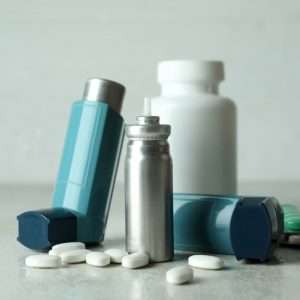Start Your COPD Exacerbation Consultation
Complete a quick and easy questionnaire and one of our prescribers will make sure this treatment is right for you.

4.6/5 Trustpilot Rating

Trusted UK Registered Pharmacy

Takes Under 2 Minutes

Secure and Confidential

Justin Dicks
Superintendent Pharmacist
GPhC Number 2038305
Treatments
Related Medication
Frequently Asked Questions
Have a question? We're here to help
What is a COPD exacerbation?
A COPD exacerbation, also known as a flare-up, is when symptoms of chronic obstructive pulmonary disease suddenly worsen. This can include increased breathlessness, coughing, wheezing, and changes in sputum colour or volume. Exacerbations are often triggered by infections or irritants and may require prompt medical treatment to prevent further complications.
What causes COPD exacerbations?
The most common causes of COPD flare-ups are bacterial or viral infections in the lungs, such as bronchitis or pneumonia. Environmental triggers like cold weather, air pollution, and cigarette smoke can also contribute. Managing these triggers and taking medications as prescribed can help reduce the risk of frequent exacerbations.
What are the symptoms of COPD exacerbation?
The typical symptoms include more frequent or severe coughing, shortness of breath, chest tightness, and thicker or discoloured phlegm. Some people may feel extremely tired or notice swelling in their ankles or legs. If symptoms become severe or sudden, it’s important to seek medical help immediately.
How is a COPD exacerbation diagnosed?
A doctor will usually diagnose a COPD exacerbation based on your symptoms and physical examination. They may check oxygen levels, listen to your chest, and possibly order a sputum test or chest X-ray to rule out infection. Early diagnosis helps guide the right treatment, such as antibiotics or steroids.
How to treat a COPD exacerbation?
The treatment often includes a short course of oral steroids, such as Prednisolone, to reduce inflammation and antibiotics like Amoxicillin or Doxycycline if a bacterial infection is suspected. Inhalers or nebulisers may also be adjusted to ease breathing. Prompt treatment can shorten recovery time and prevent hospitalisation.
What triggers COPD flare-ups?
The common triggers include respiratory infections, exposure to smoke or fumes, extreme temperatures, and seasonal allergens. Emotional stress and poor air quality can also worsen symptoms. Identifying and avoiding personal triggers is key to managing COPD effectively.
How long does a COPD exacerbation usually last?
A mild COPD exacerbation can last a few days, while more severe flare-ups may take several weeks to fully recover from. Recovery time depends on the severity of the symptoms and how quickly treatment is started. Continuing maintenance inhalers and following a doctor’s advice can help speed up recovery.
How long does it take to recover from a COPD exacerbation?
Most people start to feel better within one to two weeks, although fatigue and breathlessness may linger longer. Completing prescribed medications and getting enough rest are important for full recovery. Some patients benefit from pulmonary rehabilitation to regain strength after a severe episode.
Is COPD exacerbation life-threatening?
While mild flare-ups can often be managed at home, severe COPD exacerbations can be life-threatening if left untreated. They may cause dangerously low oxygen levels or respiratory failure. Always seek emergency medical help if breathing suddenly becomes very difficult or if you experience confusion or chest pain.
What happens if a COPD exacerbation is left untreated?
Untreated flare-ups can lead to permanent lung damage and make breathing problems worse over time. They can also increase the risk of hospitalisation and reduce overall quality of life. Prompt treatment helps prevent complications and slows the progression of COPD.
How to prevent COPD from worsening?
Stopping smoking is the most effective way to slow the progression of COPD. Regular use of prescribed inhalers, vaccinations against flu and pneumonia, and avoiding air pollutants are also important. A healthy lifestyle with gentle exercise and good nutrition supports long-term lung health.
What not to do when you have COPD?
Avoid smoking or being around second-hand smoke, as it can quickly worsen your symptoms. Try to stay away from air pollution, strong fumes, and extreme cold weather. Skipping medications or inhalers can also make flare-ups more likely, so always take treatment as prescribed.
Can COPD go away on its own?
COPD is a long-term condition that cannot be cured, but its symptoms can be managed effectively. With the right treatment plan, including medication and lifestyle changes, many people live comfortably for years. Preventing flare-ups is key to maintaining good quality of life.



















